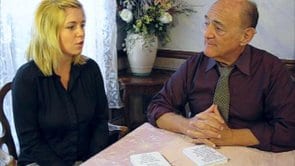 Stanley A. Terman, Ph.D., M.D., is CEO and Medical Director of Caring Advocates and the author of Peaceful Transitions: Stories of Success and Compassion; Plan Now, Die Later—Ironclad Strategy. He is also the creator of My Way Cards/Natural Dying Living Will Cards, a tool that generates Living Wills for Advanced Dementia as well as for other terminal illnesses. He spoke with SevenPonds about his work at Caring Advocates, an organization which seeks to educate, empower and advocate for individuals entering into the end-of-life, their proxy agent or their loved ones.
Stanley A. Terman, Ph.D., M.D., is CEO and Medical Director of Caring Advocates and the author of Peaceful Transitions: Stories of Success and Compassion; Plan Now, Die Later—Ironclad Strategy. He is also the creator of My Way Cards/Natural Dying Living Will Cards, a tool that generates Living Wills for Advanced Dementia as well as for other terminal illnesses. He spoke with SevenPonds about his work at Caring Advocates, an organization which seeks to educate, empower and advocate for individuals entering into the end-of-life, their proxy agent or their loved ones.
Antal: Tell us about your role at Caring Advocates. How did you find yourself working in the end-of-life field?
Stanley: I’m a psychiatrist, and I’ve been in practice since the late 1970s, and I’ve always devoted my career to trying to empower people to make decisions that will bring them peace, satisfaction in themselves and others, and to find meaning in their lives. Eventually I gravitated towards end-of-life because I found it’s in this field that it’s where you end up making some of the most meaningful decisions. Caring Advocates is a non-profit organization that strives to teach people what it’s like being in various end-of-life conditions. We’re trying to help people make their decisions, tell them what choices they have available, to provide a structure, and to create a strategy for them that will ensure that people honor their decisions. And this includes being an advocate for the dying, help them make the decisions. We provide structure, work with families and the individuals to create a strategy for them that will ensure that people honor their decisions, and when they reach their end-of-life we can be called upon again to help facilitate and be their advocate so that their wishes are honored by others.
Antal: What are some common issues or misconceptions people have concerning their end-of-life preparation?
Stanley: There’s been a lot of progress over the last few decades in treating people who have cancer, for example. Because of the major advances in keeping people alive longer, by treating heart disease, stroke, associated ailments, infectious diseases, et cetera, people are becoming more plagued with dementia, and there are a lot of fears surrounding this. The fear of getting dementia has become the number one fear at the end-of-life, that people will be forced to linger in a state which they would absolutely hate, a state in which they may suffer from pain and suffering, where they would be totally dependent on others for almost everything, would be non-communicative and would not be able to recognize their family members, and will leave memories of themselves in a state of indignity and, in their own opinion, their loved ones might disagree, they will be a burden to them for a long time.
The vast majority of patients die in the ICU after their loved ones have agreed to withhold their life-sustaining treatment. Now, people with dementia have reached an older age because they are medically well, so there are no plugs to pull, and since there’s no plugs to pull, people are at a quandary as to how long they can continue to exist in this sort of state. Maybe eight years, maybe 15 to 20 years for younger people. And this scares people, and it scares them so much that they sometimes have what I call the “dementia fear”, which is they have such a fear of going into a stage of advanced dementia, and getting stuck there, that they have a lot of anxiety, which depreciates their life, or they find a way to shorten their life, which is tragic, because there is an alternative solution to avoid lingering for years in advanced dementia.
Antal: And what is that solution?
Stanley: The solution is that they can use very clear and specific instructions ahead of time, and this is where we can come in. So that when they meet certain criteria, they can use a tool, our tools are the Natural Dying Living Will Cards to pinpoint that more precisely that point, and when they get to the stage where they’ve met those criteria, then their proxy agent and their physician can agree, take the judgments of the patient into consideration, to stop using the help of another person’s hand to put food and fluid into the mouth of the patient. So when the patient becomes incapable of recognizing or using a fork, a spoon, a straw, you can put food in front of them and it just sits there, untouched. This is allowing nature to take its course, and that’s why we call this process “natural dying,” when they stop receiving any help from another person, feeding them through a spoon to the mouth or so, which can prolong their dying process. So you stop giving them their medical treatments (except maybe antibiotics in certain cases), you can give them some pain reduction and thirst control agents, and allow the patient to die peacefully of his or her disease within two or three weeks.
 Antal: I noticed on your website that you had a link to a survey concerning dementia. What if the patient hasn’t prepared their directives and they reach the stage where they’re not of sound mind to do so?
Antal: I noticed on your website that you had a link to a survey concerning dementia. What if the patient hasn’t prepared their directives and they reach the stage where they’re not of sound mind to do so?
Stanley: First of all dementia is very common, we all have a risk — by the time you’re 85 years old, one in three people of that age have dementia. So it’s very common. I suggest, if you haven’t completed your directives, or you’ve completed directives that don’t do such a good job of addressing dementia, does a good job on other diseases but not on dementia, I suggest gathering around you those people who know the patient very well, what they valued, what kinds of treatments they favored, what their opinions were. And these people can use a tool, the Natural Dying Living Will or My Way Cards, and you can imagine how would the patient answer these questions for themselves. If you get a good group, with parents, pastor, brother, sister and psychiatrist, so forth, that’s ideal, because certain biases may cancel each other out and you’re much more likely to get a more accurate estimate of what the patient may want, what decisions the patient might make for themselves, at that time. It’s also much less stressful making these difficult decisions as a group.
Antal: What do you suggest for patients who are in denial about their condition?
Stanley: Denial is common for all kinds of things in our lives, and it’s not always pleasant to think about what we’re going to be like when we reach the stage of advanced dementia, so people generally procrastinate and don’t do the advanced planning, which is like an ounce of prevention for a ton of suffering. One of the reasons I designed the survey that you found on my website is because people who take the survey are very likely to be motivated to do advanced planning. So interest is important, taking initiative. So if they take the survey they might find that not only do they contribute to our research, which we like, but they also might recommend the survey to loved ones or friends and might help motivate others to do the diligent advanced care planning that’s necessary, because the challenges of advanced dementia are so significant.
Antal: So to wrap it up, do you have any final thoughts or words of advice for our readers?
Stanley: Everybody will soon be affected by dementia. It’s an epidemic that will soon be called a tsunami. If you’re not affected directly because you don’t get dementia, then it’s likely to hit a grandparent or a parent or an aunt and uncle. We’re gonna go from five and a half million to thirteen million by the middle of the century. So if we learn about it now, then we can prepare for it, and if we prepare for it then everyone will be better off. Now there’s a lot of research that still needs to be done, and this is the kind of research that’s very difficult to prove, to find the magic, and this is at least three to five years off. So it’s not realistic to expect that there will be a medicine for this by the time your parents have dementia. But the worst, most cruel part of dementia can be addressed through advanced planning and documentation.

 How Do You Prepare for Dementia? An Interview with Stanley Terman
How Do You Prepare for Dementia? An Interview with Stanley Terman




 The Spiritual Symbolism of Cardinals
The Spiritual Symbolism of Cardinals

 Flawed Kidney Function Test Discriminated Against Black Patients
Flawed Kidney Function Test Discriminated Against Black Patients















If some one desires to be updated with latest technologies after that he must be visit
this web site and be up to date everyday.
Report this comment
Very good article. I definitely appreciate this website.
Continue the good work!
Report this comment
Thanks Danny!
Report this comment